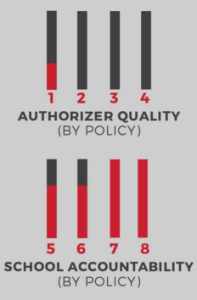
A new report grades charter school policies in Florida and other states.
From new laws to constitutional amendments, Florida lawmakers will have a raft of charter school changes to consider when their annual session convenes next month. Many of those proposals are aimed at improving charter school oversight, which is also the focus of a new report on state charter school laws by the National Association of Charter School Authorizers.
The group is focused on improving charter school quality. Its 2015 state policy rankings place Florida near the middle of the pack.
Florida's score improved this year, thanks in part to a new standard charter school contract that will require charters to provide yearly updates on their progress toward the academic goals in their contracts.
The state receives pretty good marks for charter school accountability, but its score suffers because it doesn't allow entities other than school districts to sponsor charters, and doesn't evaluate authorizers based on the performance of the schools they oversee.
Among other things, the report recommends that Florida:
Some states, like Ohio, Alabama and Nevada, passed new laws that helped improve their scores in this year's report. Others, like New York, are home to authorizers that have done a good job despite "deficiencies" in their state policies. There may be other lessons Florida and its school districts can learn from those places.